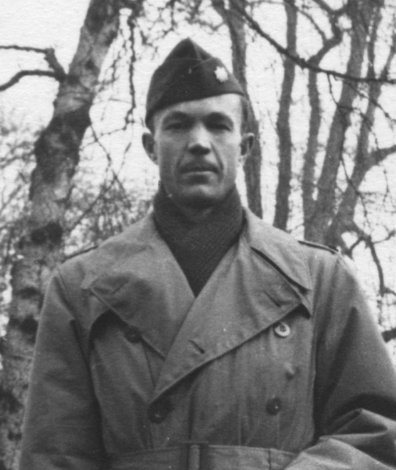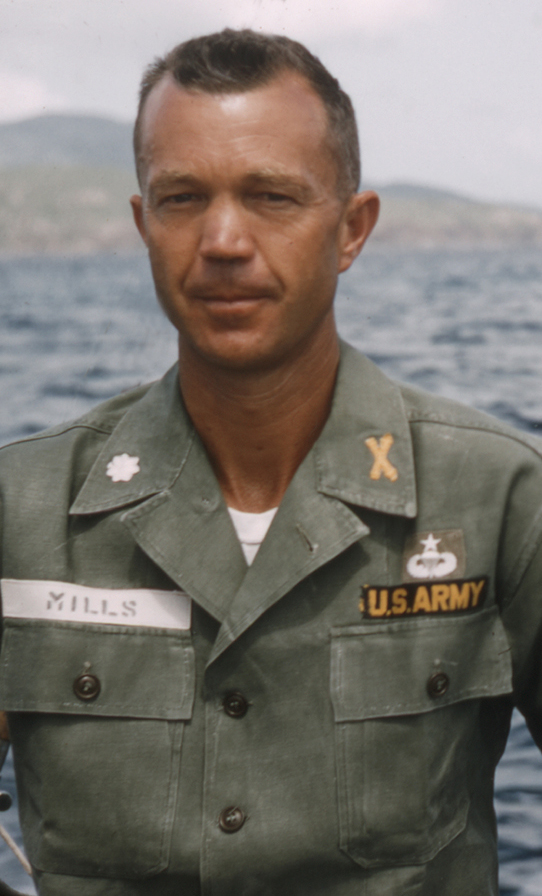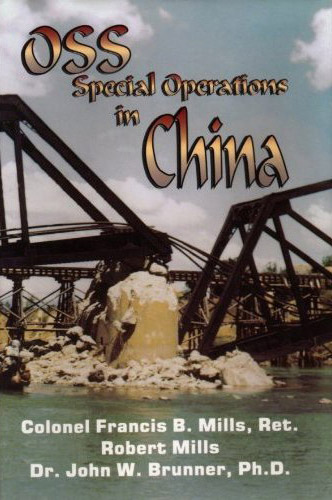OSS Special Operations In China
by
Colonel Francis B. Mills
Robert Mills and John Brunner
Phillips Publications, 2003
550 pages
These are the previously untold true stories of the Special Operations teams of the OSS in China during World War II, told by the men who were there. For more than 35 years the official records of the operations of the OSS in China remained classified SECRET or TOP SECRET and unavailable to the public. The CIA has declassified most of these records, so the stories about OSS Special Operations can now be told. These small teams of highly skilled volunteers were given the job of training, arming and leading Chinese guerrilla fighters against the occupying forces of the Imperial Japanese Army. In an unknown land facing vast armies, they were sent into the adventure of a lifetime.
The author was the officer in charge of eleven of those OSS teams, whose area of operations was all of China north of the Yangtze river -- an area larger than the United States. In a very few months these teams organized tens of thousands of fighters, and carried off highly successful missions that disrupted Japanese communications and transportation. Just as important, their actions kept hundreds of thousands of Japanese soldiers at their posts in China and away from approaching US and Allied forces in the Pacific.
The stories are told using official transcripts of actual radio messages, team logs and after-action reports retrieved from the National Archives, and the personal diaries and recollections of team members. But these are no dry descriptions. The sense of being on an exciting, unique and dangerous adventure comes through on every page. The men were the adventurous sort to begin with, who found exactly what they had been looking for -- dangerous missions in an exotic land against a formidable enemy. Colonel Mills' overview and analysis make for as complete a picture of the operations as possible. Many photographs of the teams in the field are also included.
The secret war of the Office of Strategic Services in China is finally revealed in this book, and the men who fought that war are now given much deserved and long delayed recognition.
Following is an EXCERPT from the book:
Major Cyr's (the leader of Team Jackal) first objective after getting support from the Chinese general commanding the Puppet forces was to attack the north-south Ping-Han Railway.
In the first resupply parachute drop, we had given him enough explosives for the railway attack. Each guerrilla team had to be trained how to handle, place and detonate the rail and bridge demolitions. They had to learn the timing, movement to the attack and escape procedures, in addition to weapons-handling and the tactics of dealing with the Japanese railway guards and the Puppet troops. All of this took a great deal of time.
The team was running and hiding most of the time, avoiding capture by Japanese search units, maintaining secrecy, preparing for the second parachute resupply drop and making plans and preparations for an attack on the Yellow River Bridge after the big railroad demolition job.
In planning for the railway attack we all realized that piecemeal demolitions and rail cuts from time to time would only serve to keep the Japanese on alert and cause them to mount larger and more extensive search and destroy operations to find and wipe out the American teams with their guerrillas. Unless the demolition attacks could be carried out in their entirety, simultaneously, they could not achieve the objective of disrupting enemy rail movements for any appreciable time.
The plan involved coordinated attacks by several thousand guerrillas over a twenty-mile stretch of the Ping-Han railway, all on the same night – June 26th. That would achieve the surprise required if preparations for the attack could be concealed from the Japs. The security of information about Cyr's plan was vital to success, and not easily maintained in an operation so large and complex.
As it developed, we learned our first important lesson in contacts with the Nationalist Chinese in the area. Those who were loyal to Chiang Kai Shek might have had some sympathies for the Communists in the civil war that had been raging in China for many years, but they hated the Japanese invaders bitterly and would go to great lengths to help and protect the Americans in our war against them. There was no indication that the Chinese military or any of the civilian population ever thought of betraying us to the Japs, which they could easily have done many times.
They all seemed to admire the United States very much and wanted to help us bring an end to this terrible, long and vicious war begun by the Japanese with the intent of taking over all of Asia. From the initial contacts we learned that we could trust the Chinese military with whom we had to work, and trust the Chinese population in the entire area, to safeguard and help us in our efforts against our common enemy.
It was an important and essential lesson to learn, for which we were very thankful. Support and effective help by the civilian population was the essential ingredient that allowed the OSS to operate in China. It had been equally as essential in fighting the Germans behind their own lines in all of the countries of Europe where we had operated successfully. Civilian support is still essential in any country in the world today where the United States wants to help people fight against oppression. We did not have this essential support in Vietnam.
From the JACKAL Team Log:
June 6. While we were still at Chang Dzwan, the Air Force bombed a troop train about a half mile from the compound. The train was empty, as the Japs had abandoned it on approach of the fighter-bombers. Attempts were made to contact pilots over the VHF voice radio, but we couldn't raise them on the air.On June 7 we were awakened at 0100 hours and told that we had to move immediately as the Japs were in a nearby village asking if anyone had seen any Americans, and were searching all houses.
Jackal moved out and arrived at Ren Siao Yin about 0430 on the same morning.
Again, quarters were a three-room mud hut. After a few hours sleep we set up the radio to contact the base at Hsian. A later report indicated the Japs had moved into Chang Dzwan shortly after departure of the team.
At Ren Siao Yin, two Japs came into town under pretense of searching for stolen horses. The following day a group of 15 Japs came in looking for stolen weapons. Both parties failed to search the house where we were hiding.
We remained there until June 13th. Three team members were suffering from dysentery and were temporarily incapacitated. Dysentery, diarrhea and worms continued to impede and plague us for the duration of stay.
During all of our operations in China, as well as in Burma, Thailand and other parts of Asia, OSS personnel were continually beset by a variety of digestive diseases for which immunities had been developed by most of the Chinese during centuries of exposure. These were always stressful and uncomfortable irritants that added to the problems of operating against the enemy and staying alive in this very foreign and strange environment.
Diet was mainly eggs, soup and rice, cooked Chinese style which was far from sanitary. The teams out away from a U.S. base didn't usually have military canned rations that were safe to eat, and had to depend on the Chinese with whom they worked and lived to prepare food for their meals. So it was no picnic behind enemy lines, and the team members were sick and incapacitated to some extent most of the time while they remained in enemy-controlled territory.
The Team Log continues:
Japs were continually patroling in the village, and frequently passed along by the team headquarters. But for the efforts of Go Cha Ling, guerrilla chief in the village and his 250 men who protected us, Japs would certainly have entered our bivouac and captured the team.
On June 10th Commander Herr came into the base and reported Japs had searched his compound on the previous day. Equipment we had left behind had not been found. Herr recommended we return to his headquarters at Tien Nin Sher. This was agreed to because guerrillas could be more readily trained there and handy in case of planned operations.
The move was made on June 13 under cover of darkness.
When the party returned here Major Cyr dug out the hidden supplies.
On June 14th, conference was held with guerrilla chiefs Wang Go Shang, Herr Lang Ting, Go Cha Ling and Colonel Lee, a First War Area representative. General plans were discussed for sabotage and attacks on the Ping-Han.
It was decided the presence of the Americans and the 150 guerrillas in training would make the area unsafe and attract the Japanese once again. It was then decided that Captain Zarembo should lead the group to a safe place about 60 miles away, in the village of Gun Wan where training would be carried on. The plan was approved by General Sun Din Yin, commander of Puppet troops in the area, who was our friend – we hoped.
Major Cyr and interpreter Boris Chu remained behind to coordinate the railway attack plans.
On the evening of the 14th, Zarembo and his group moved out.
Cyr immediately began formulating plans. He instructed Commander Herr's men in making railroad charges. Within the next several days approximately 1,000 explosive charges were prepared. This was going to be an attack the Japanese would remember!
June 20. Radio Message from Mills to Jackal:
WANT TO GO AHEAD WITH RAILROAD CUTS, BUT CANNOT IF CYR AT TIEN NIEN SHER. IMPORTANT TO STOP JAP RAIL MOVEMENT. WILL ARRANGE DROP FOR NEW TEAM BEFORE END OF MOON PERIOD, SHORTLY AFTER 26 JUNE. PILL BOX REPORT BEING CHECKED.
June 22. Reply from Jackal:
GOT YOUR GO AHEAD ON RAIL CUTS. PLAN DATE 26 JUNE. BANZAI!
ABOUT THE AUTHOR
In 1943, as an Army Major in the Field Artillery, Frank Mills volunteered for overseas duty with the Office of Strategic Services (OSS). After training in Special Operations, he was ordered to London to join the combined Special Forces Command of British, French and Americans, to support Resistance efforts in Europe as part of the Allied invasion of France.
With OSS Special Forces Detachment 10, he landed in the D-Day Invasion with advance elements of the First Infantry Division on Omaha Beach. He coordinated French Resistance activities with the military operations of First Army as the Allied invasion forces went ashore and moved through France.
When the German forces had been driven out of France in late 1944, he was named OSS Chief of Special Operations for the Central Field Command in China. In that capacity he was in charge of all OSS guerrilla warfare against the Japanese Expeditionary Army in the area extending about 1,000 miles north from the Yangtze River and along the Yellow River. He remained at that command until September, 1945.
After the war he served with Army Intelligence in the Pentagon and with British Military Intelligence in London, where he served for two years under Major General Gerald Templar of Burma fame. Later he served with the 11th and 82nd Airborne Divisions, and for many years in developing the Army's Special Forces (The Green Berets). He served with Admiral Radford, Commander in Chief, Pacific, where he developed Unconventional Warfare plans for the Asian area. He was a Plans Officer at Headquarters, Eighth Army in Korea.
In 1959 he was selected as Commanding Officer of the First Special Forces Group on Okinawa for operations throughout Asia, including Viet Nam. His next assignment was Assistant Commandant of the Special Warfare School at Fort Bragg during a period of rapid expansion and emphasis on special training, where he was awarded his second Legion of Merit for exceptional service.
He then served as Chief of Special Plans for U.S. Strike Command, for South America, Africa and the Middle East. He was a faculty member of the Armed Forces Staff College when he retired from the Army after 27 years of active duty.
Colonel Mills received a Political Science degree from the University of Oklahoma. He was a graduate of the U.S. Army Artillery School, the Special Warfare School, the Command and General Staff College and the Army War College.
He was a Master Parachutist, and was awarded the Legion of Merit twice, the Bronze Star, the Chinese Special Order of Y'un Hui, and Wings of the Thai Ranger Battalion, Korean, Philippines, and Vietnamese Special Forces.
He passed away at his home in Virginia Beach in 2005 at the age of 90, and was laid to rest in Arlington National Cemetery.
"A great book for anyone interested in World War II history. True adventure stories on a scale greater than Lawrence of Arabia."
"A must-read to understand current as well as past US-China relations."
"A fast read, funny at times, exotic, inspirational and always interesting."
Major Frank Mills
OSS London 1943

Lt. Col. Mills

Colonel Mills in Thailand
1st Special Forces


